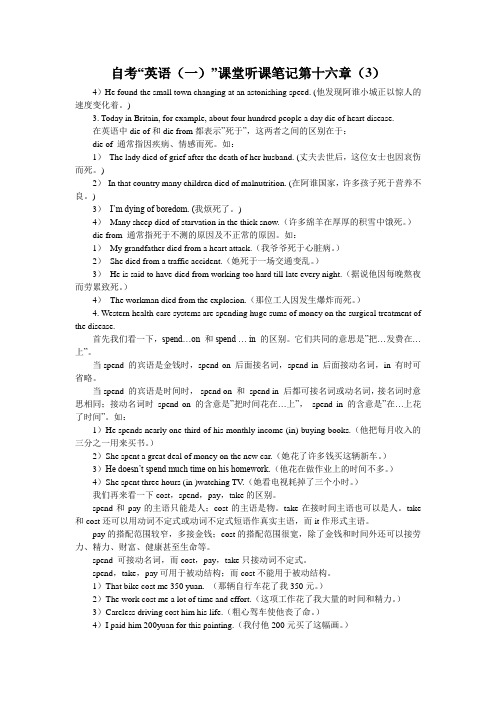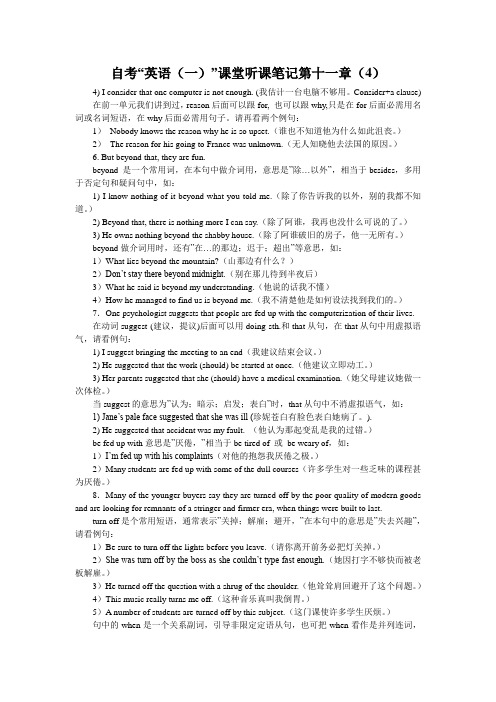自考英语(一)课堂笔记完整版(8)
- 格式:doc
- 大小:59.50 KB
- 文档页数:7

扫描/长按下面二维码免费做题、免费学直播课点击查看:2018年自学考试《英语(一)》复习笔记汇总eacross偶然遇到,碰到/动词词组2.Lookup查找/动词词组3.Attopspeed快速的/介词词组4.Dependonsb./sth.依赖某人或某事5.Afterall毕竟/副词词组6.Beginwith开始于什么/动词词组7.Makesense有意义/动词词组8.Haveapreferenceforsth./doingsth.偏爱,优先选择/动词词组9.Lookfor寻找/动词词组10.Gothrough经历/动词词组eupwith想到(如:某个想法/主意)/动词词组12.Sparkainterestinsth.激发做某事的某种兴趣/动词词组13.Beinvolvedinsth.参与某事/动词词组14.Leadto导致/动词词组15.Developahabit养成习惯/动词词组16.Providesb.withsth.为某人提供某事/动词词组17.Sharpensb.’sawarenessofsth.提高某人的什么意识/动词词组语言点:1.A.Whenstudentsinacollegeclasswereasked whatshouldbedonewhentheycameacrossane wwordintheirreading,84percentsaid,“Lookitupinthedictionary.”B.Supposesomeoneas ksyouwhattheword“fast”means.2.Makeone’seffortsmostproductive宾补;使你的努力变得有成效。
3.Readingtravelbooksapparentlycomes“bef ore”otherkindsofreading.动名词做主语4.语法:Onlywhenyougothroughthementalexercisest ocomeupwithatentativedefinitionshouldyou openthediction arytoseeifyou’reright.倒装句型Only+状语+助动词+主语+动词的适当形式+其他e.g.Onlyinthatwaycouldwesolvetheproblem.OnlywhenheleftdidIfeellonely.5.Heighten(v.提高、升高)heightened(adj.提高的);increase(v.提高)increased(adj.提高的)·归纳总结常考内容,针对性做题巩固提分·根据学员做题大数据统计,集中讲解突破高频、易错、易混题·高效扫灭得分雷区、拿准采分点④考前核心考点集训课考前核心考点集训课:课程作用:名师点拨2课时,必看必会必背·圈划考题范围,预测考点·名师点拨,2课时科学提分·赠送考前集训宝典(配套专属资料,禁止传播)快,每科2轮8次课(第1轮精讲8次课,第2轮层层总结共8次课);准,AI大数据考点预测;狠,考点、考题一步到位!①必学考点精讲课。

自考“英语(一)”课堂听课笔记第十六章(3)4)He found the small town changing at an astonishing speed. (他发现阿谁小城正以惊人的速度变化着。
)3. Today in Britain, for example, about four hundred people a day die of heart disease.在英语中die of和die from都表示”死于”,这两者之间的区别在于:die of 通常指因疾病、情感而死。
如:1)The lady died of grief after the death of her husband. (丈夫去世后,这位女士也因哀伤而死。
)2)In that country many children died of malnutrition. (在阿谁国家,许多孩子死于营养不良。
)3)I’m dying of boredom. (我烦死了。
)4)Many sheep died of starvation in the thick snow.(许多绵羊在厚厚的积雪中饿死。
)die from 通常指死于不测的原因及不正常的原因。
如:1)My grandfather died from a heart attack.(我爷爷死于心脏病。
)2)She died from a traffic accident.(她死于一场交通变乱。
)3)He is said to have died from working too hard till late every night.(据说他因每晚熬夜而劳累致死。
)4)The workman died from the explosion.(那位工人因发生爆炸而死。
)4. Western health-care systems are spending huge sums of money on the surgical treatment of the disease.首先我们看一下,spend…on 和spend … in 的区别。

自考“英语(一)”课堂听课笔记第二章(5)Text B Advertising短语表达1. attract attention吸引注意He talked loudly to attract attention.(他大声说话以吸引注意。
)2. for the most part在很大程度上,多半These cars, for the most part, are made in China.(这些汽车多半产于中国。
)3. persuade sb. to do sth.劝某人做某事be persuaded to do sth.被劝说做某事The doctor persuaded my father to give up smoking.(医生劝我父亲戒烟。
)The young man was persuaded to take up that job.(阿谁年轻人被劝说接受那份工作。
)4. a large amount of一大笔He borrowed a large amount of money from the bank.(他向银行借了一大笔钱。
)5. put out发布,公布;出版;广播The article was put out in a national magazine to reach a larger audience.(为了能影响更多的读者,文章被登发在一份国家级杂志上。
)This newspaper is put out every day.(这份报纸每天出版。
)The weather forecast has just put out a storm.(天气预报刚刚发出了暴风警报。
)6. be characteristic of为…所特有,是…的特征Rainy days are characteristic of March.(多雨的日子为三月所特有。
)7. catch the eye引人注目The beautiful blue dress in the window caught her eye when she passed the store.(她经过那家商店时,橱窗里标致的兰色连衣裙吸引了她。

12. communicate v. 交流,交际,通讯 communication n. 交流,通讯 communicative adj. 爱说话的 To communicate with him is no easy job, as he is not a communicative person.(他是⼀个不爱说话的⼈,与他交流可不容易。
) Speech and writing are man's most important methods of communication.(说和写是⼈类最重要的交流⽅式。
) 13. inexact adj. 不正确的,不精确的 与independent⼀样,该词是由形容词 exact加前缀in- 构成的。
14. incomplete adj. 不完整的 complete adj.& v. 完整的;完成 This is an incomplete sentence, please add the omitted part and make it complete. 〔这是⼀个不完整的句⼦,请加上省略的成分使其完整。
〕 I don't think I can complete the work in 2 hours. 〔我想我在两⼩时内⼲不完这活。
〕 15. purpose n. ⽬的,意图,⽤途 purposeful adj. 有⽬的的,有意图的 purposefully adv. 有⽬的地,蓄意地 The purpose of the meeting was to discuss his proposal.〔会议的⽬的是讨论他的建议。
〕 He let out the information purposefully to you.〔他有意向你透露了这个消息。
〕 16. regularly adv. 经常地,定期地 regular adj. 经常的,定期的 irregular adj. 不规则的,⽆规律的 If you review your lessons regularly, you will do well on tests. 〔如果你定期复习功课,就能在考试中取得好成绩。

自考“英语(一)”课堂听课笔记第十八章(2)export-oriented industries(外向型工业)an education-oriented family(一个重视教育的家庭)test-oriented teaching and learning(以应试为目的的教学)13.Immovable adj. 不成移动的;坚定不移的这个词的词根是move,-able是形容词后缀;im-是反义词前缀,通常在m,p开首的单词前。
如:impassable(无法通过的),importable(可进口的),immedicable(无法医治的)等等。
1)Father was immovable in his opinions.(父亲的意志坚定不移。
)2)He didn’t expect that he would face an immovable audience.(他没料到他将面对一群不动情的不雅众。
)3)What are you going to do with this immovable pillar?(这根移动不了的柱子你打算怎么处理?)14.arrangement n. 安排;安插;整齐arrange v. 安排;安插1)Have you made all the arrangements for the conference?(你为会议做好所有安排了吗?)2)He wants to make sure that everything is in neat arrangement.(他想确保一切都整整齐齐。
)3)She didn’t want to after the arrangement of fur niture in the room.(她不想改变房间里家俱的位置。
)4)I will make arrangements for a car to meet you at the airport.(我将安排一辆汽车去机场接你。

自考“英语(一)”课堂听课笔记第十一章(4)4) I consider that one computer is not enough. (我估计一台电脑不够用。
Consider+a clause)在前一单元我们讲到过,reason后面可以跟for, 也可以跟why,只是在for后面必需用名词或名词短语,在why后面必需用句子。
请再看两个例句:1)Nobody knows the reason why he is so upset.(谁也不知道他为什么如此沮丧。
)2)The reason for his going to France was unknown.(无人知晓他去法国的原因。
)6. But beyond that, they are fun.beyond 是一个常用词,在本句中做介词用,意思是”除…以外”,相当于besides,多用于否定句和疑问句中,如:1) I know nothing of it beyond what you told me.(除了你告诉我的以外,别的我都不知道。
)2) Beyond that, there is nothing more I can say.(除了阿谁,我再也没什么可说的了。
)3) He owns nothing beyond the shabby house.(除了阿谁破旧的房子,他一无所有。
)beyond做介词用时,还有”在…的那边;迟于;超出”等意思,如:1)What lies beyond the mountain?(山那边有什么?)2)Don’t stay there beyond midnight.(别在那儿待到半夜后)3)What he said is beyond my understanding.(他说的话我不懂)4)How he managed to find us is beyond me.(我不清楚他是如何设法找到我们的。
语法构词法英语词的构成有一定的规律,这种规律称为构词法。
掌握构词法知识对我们更好地理解词义、认识新词和扩大词汇量有重要意义。
构词方法主要有三种:派生法、合成法和转换法。
一、派生法在一个词的词根(root)的前面或后面加上某个词缀来产生新词,这种构词法称为派生法(derivation)。
加在前面的词缀叫前缀(prefix),加在后面的词缀叫后缀(suffix)。
prefix / suffix(一)后缀:许多名词、形容词、副词和动词是由词根加后缀构成的。
1.构成名词的常用后缀有:(1)-er, -or, -ist, -ee, -ian, -ese, -ant 等用于构成表示人或物的名称。
例如:reader、writer、translator(翻译者)、artist、dentist(牙科医生)、employee(雇员)、American、Chinese、Japanese、assistant(助手)等。
注意区分:employee 表示雇员;employer 表示雇佣别人来做工的人;雇主(2)-ance, -ence, -(a) tion, -sion, -ics, -ing, -ity, -ment, -ness, -th, -ty, -ure, -ship 等用于构成表示行为、性质、状态等的抽象名词。
例如:acceptance(接受)、dependence(依靠)、preparation(准备)、discussion(讨论)、physics(物理学)、building (建筑物)、reality(现实)、greatness(伟大)、length(长度)、safety(安全)、pressure(压力)、friendship(友谊)等。
2.构成形容词的常用后缀有:-able, -ible, -al, -ful, -less, -ish, -ive, -ous, -an, -ic, -ly, -y, -ant, -ent, -ary, -en 等。
Unit1 4. They need hundreds of hours of study and practice, and even this will not guarantee success for every adult language learner. 注意句中hundreds of hours的⽤法,阅读课本第六页注解2. 请翻译下⾯的词组: 1)⼗个学⽣ ten students 数⼗个学⽣ tens of students 2)五百年 five hundred years 数百年 hundreds of years 3)两千年 two thousand years 数千年 thousands of years 4)三百万美元 three million dollars 数百万美元 millions of dollars 5. Language learning is different from other kinds of learning. 句中be different from 意为“与…不同”,如:My opinion is different from yours.(我的观点与你的观点不同。
) 请注意下⾯三个句⼦中所⽤的词组: Man is different from all the other animals in his ability to learn and use a language. Man differs from all the other animals in his ability to learn and use a language. The greatest difference between man and all the other animals is his ability to learn and use a language. 从上⾯的句⼦中可以看出differ是动词,different 是形容词,difference是名词。
Unit16(第47讲—第49讲) Text A Heart Disease:Treat or Prevent? 本课主要词组 1.western adj. 西⽅的;西部的 Westerner n. 西⽅⼈ 1) The sun began to turn red on the western horizon. (太阳在西⽅地平线上开始变成红⾊。
) 2) I've just had four years in Western Nigeria.(我刚在西尼⽇利亚呆了四年。
) 3) The impact of western technology on that country was incredible.(西⽅技术对那个国家的影响是难以置信的。
) 4) Many Westerners eat too much food rich in sugar and fat, they may die of heart illnesses at an early age.(许多西⽅⼈吃太多⾼糖、⾼脂的⾷品,他们可能在年轻时就会死于⼼脏疾病。
) 5) Westerners eat with forks and knives, while we Chinese eat with chopsticks.(西⽅⼈⽤⼑叉吃饭,⽽我们中国⼈⽤筷⼦吃饭。
) 2.alarm n. 惊恐;担⼼;闹铃 v. frighten (使惊恐;向…报警) alarming adj. worrying, disquieting (使⼈惊恐的、令⼈担⼼的) 1)There is no cause for alarm. (不必恐慌。
) 2)It is necessary that you install a burglar alarm.(你有必要装防盗警报器。
) 3)They were alarmed to find the old lady dead.(他们发现⽼太太死了,⼤惊失⾊。
自考“英语(一)”课堂听课笔记第22章Text A current attitudes toward physical fitness本课主要单词1.fitness n. 适当,合理;健康fit v. (使)适合;与…相称;合身;容纳adj. 合适的;正当的;健康的;合格的1) He does morning exercises every day to improve his fitness.(他每天做早操以增加体质。
)2) He tried every means to make me believe the fitness of his decision.(他尽一切可能使我相信他的决定的合理性。
)3) I am going to help you choose the fridge that fits your needs.(我将帮你挑选适合你需要的冰箱。
)4) Try on this jacket and see if it fits you.(试试这件茄克,看看是否合身。
)5) This shelter can only fit a family of three.(这个防空洞只能容纳一家三口。
)6) The water in this river is not fit to drink.(这条河里的水不适合饮用。
)7) She is fit for the job.(她能胜任这项工作。
)8) The old man looks fit.(那位白叟看上去身体很好。
)2. misuse v. (n.)误用,滥用;虐待mis-是一个常用的前缀,意思是badly or wrongly. 如misunderstand(误解),misdirect (指错标的目的),misfortune(不幸),misspelling(拼写错误)1) He misused a word in his report, which caused much confusion.(他在报告里用错了一个字,引起了莫大的混乱。
Unit4(第11讲—第13讲) 3. Meaningfulness affects memory at all levels. affect 是动词,意思是“影响”。常常会有一些英语学习者把动词affect和名词effect混淆,请注意下面的句子:
1) The drought would surely affect the harvest.(这场干旱肯定会影响到收成。) 2) Excessive smoking affected his health, bad coughs often made it difficult to breathe.(过度吸烟影响了他的健康,严重的咳嗽使他难以呼吸。)
3) Psychologists believe that colors have a definite effect on people.(心理学家认为颜色对人肯定有影响。)
4) We could all see the effects of the illness on him.(我们都能看出那场病在的身上的影响。)
5) 职务的变化使他的收入大受影响。(The change in position greatly affected his income.)
6) 他的话对听众没有任何影响作用。(What he said had little effect on the audience.) 4. Information that doesn't make any sense to you is difficult to remember. that引导的定语从句修饰information; 主句是Information is difficult to remember. 不定式to remember 用在做表语用的形容词后面作状语。请看下面的句子: 1) Einstein was easy to get along with.(爱因斯坦很容易相处。) 2) To many foreigners, Chinese is hard to learn.(对许多外国人来说汉语很难学。) 3) The water in this river is not fit to drink.(这条河里的水不适合饮用。) 4) This question is very difficult to answer.(这个问题很难回答。) make sense 的意思是“有意义;可理解”。请看下面的句子: 1) No matter how you read it, this sentence doesn't make any sense to me.(无论你怎么读,我都不理解这个句子。)
2) What the writer wanted to express in his book doesn't make any sense to the readers.(读者们无法理解作者在书中所要表达的意思。)
3) His explanation makes no sense to his students.(学生们不理解他的解释。) 5. Organization also makes a difference in our ability to remember. 动词不定式to remember在句中做定语,修饰名词ability.请看下面的句子: 1) You should have confidence in your ability to fulfill the task.(你们应对自己完成认务的能力有信心。)
2) He has kept the promise to come early in the morning.(他遵守了一大早来的诺言。) 3) They have the determination to overcome all the difficulties.(他们有克服所有困难的决心。)
4) We could see her anxiety to solve the problem.(我们能看出她急于解决这个问题。) make a difference 的意思是“有关系;有影响;起作用”。请看下面的句子: 1) What he said would not make any difference in my decision-making.(他说的话不会对我做决定产生任何影响。)
2) Your participation in the work will make a great difference.(你参与我们的工作,情况就不一样了。)
3) Money won't make much difference to him.(钱对他起不了多大作用。) 4) I didn't like the appearance of the house, but the location and price made all the difference.(我不喜欢那房子的外观,但它的位置和价格起了重要作用。)
6. Material that is organized is better remembered than jumbled information. 句中的better是副词well的比较级形式,意思是“更好地”。请看下面的句子: 1) This story is better written than that one.(这个故事写得比那个好。) 2) This room is better furnished than that one.(这间屋子装饰得比那间好。) 3) This team is better trained than that one.(这个队训练得比那个队好。) 4) This job is better paid than that one.(这份工作的报酬比那份高。) information是一个不可数名词,不能在其后加“-s”。请看例句: 1) There are many ways of obtaining information.(获得信息的途径很多。) 2) So far I haven't got any information about the game.(我至今还没有得到有关比赛的任何消息。)
3) I am sure this piece of information will be of great value to them.(我肯定这一消息对他们会很有价值。)
7. Chunking consists of grouping separate bits of information. 在第一单元的Text B中我们已经对consist of有所了解。这一词组的意思是“由…组成”,它与be made up of;be composed of 的意思相近,但consist of 不用被动语态。请看例句:
1) The United States consists of 50 states.(美国由50个州组成。) 2) The United Kingdom consists of Great Britain and Northern Ireland.(英国由大不立颠和北爱尔兰组成。)
3) Their team is made up of 6 team members.(他们队由6名队员组成。) 4) Our class is made up of 45 students.(我们班由45名同学组成。) a bit在句中的意思是“一点,一些”,它可以用在形容词的前面, 但是不能用在名词的前面。在名词前面必须用a bit of.请看下面的例句:
1) I am a bit tired today.(我今天有点累。) 2) He said he was bit hungry.(他说他有点饿。) 3) Your article is a bit long for our paper. (你的文章对我们的报纸来说有点长了。) 4) He gave the bird a bit of water. (他给了鸟儿一点水。) 5) I would appreciate it if you could give me a bit of good advice.(如果你能给我一点宝贵建议我会很感激的。)
6) I only know a bit of Spanish. (我只懂一点点西班牙语。) 8. Categorizing is another means of organization. 句中的means是一个名词,意思是“方式;手段”,它不是动词mean的第三人称单数。请看下面的例句:
1) The quickest means of travel is by plane. (最快的旅行方式是乘飞机。) 2) Bicycle is the most convenient means of transport. (自行车是最方便的交通工具。) 3) Email is a modern means of communication. (电子邮件是一种现代通讯方式。) 4) He means what he says. (他说话算数。) 5) Forgetting the past means betrayal. (忘记过去就意味着背叛。) 9. Many people will group them into similar categories and remember them as follows:
group into在句中的意思是“把…分组;把…归类”。请看例句: 1) We can group the animals into several types. (我们可以把这些动物归成几类。) 2) Group the words into similar categories and they will be more easily to remember.(把类型相似的单词归类,记起来就更容易了。)
as follows 的意思是“如下”,请看例句: 1) The full text reads as follows: (全文如下:) 2) The results are as follows: (结果如下:) 10. Association refers to taking the material we want to remember and relating it tosomething we remember accurately.